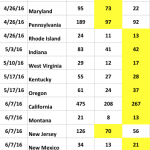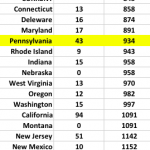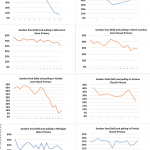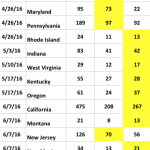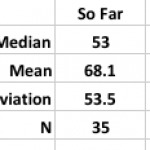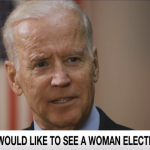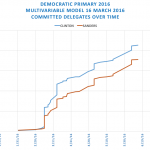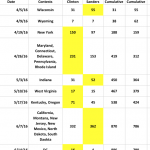Election 2016
Voting is not party involvement.
We hear a lot of talk these days about "voters" being repressed in their attempt to be involved in the Democratic primary process. There may be something to that, and it might be nice to make it easier for people to wake up on some (usually) Tuesday morning and go and vote in a Democratic or Republican primary or visit a caucus. But there is a difference between a desire for a reform and the meaningful understanding of that reform -- why we want it, how to do it, and what it will get us -- that makes it important to do what we Anthropologists sometimes call…
I recently noted that a reasonable prediction indicates that Trump could enter the Republican National Convention a mere 8 delegates short of a lock. (See this.)
But now, Ted Cruz may have changed that math a bit, by announcing that Carly Fiorina as his vice presidential running mate. She was one of the least popular of the candidates when she was running as one of the clowns in the GOP clown car earlier this year. One could even argue that she wasn't merely unpopular, but did so much damage to her own credibility among the Republican voters that she left the race in the negative popularity…
Reports are just coming in, and as if often the case, Trump is already being declared winner in some states. But the Democratic primaries are different ... there are actually two candidates who get delegates instead of just one ... so it takes a little longer to count up the votes.
As a reminder, these are my predictions for today's primaries. I predict a Clinton win in Delaware, Maryland, and Pennsylvania, but a Sanders win in Connecticut and Rhode Island.
However, I have less confidence in these predictions than usual because I think something is happening in the campaign. I think, given…
Between now and the end of the primary season, I expect Sanders to pick up more delegates than Clinton, in total, by a very small margin.
On Tuesday, April 26th, there will be primaries in Connecticut, Delaware, Maryland, Pennsylvania and Rhode Island. That's 384 pledged delegates at stake.
Polls put Clinton ahead in all these states, but not all the polls are current and not all the Clinton leads are strong.
Added Note:
I noticed some very strong reactions in the comments section from people apparently (but not very clearly) accusing me of making up numbers to make it look like Sanders…
We hear a lot about how the system is rigged against Sanders and in favor of Clinton. Such yammering is normal for a political campaign, but if you believe it, I'd love to sell you a nice bridge down near New York City.
There are two things you need to know.
First, the Sanders campaign, according to senior Sanders campaign advisor Ted Devine, does not regard the system as rigged against them. Here's what he said (see below for full video):
I don't think there is. Unlike the Republicans Trump in particular, we are not going around saying everything is rigged. The rules are as the are. We may…
UPDATE May 26th 2016
Moments ago, Donald Trump's delegate count effectively went above the number needed to guarantee the nomination at this summer's Republican National Convention.
As reported by NBC, "Donald Trump now has the support of 1,238 delegates — just a hair above the 1,237 threshold needed to clinch the Republican presidential nomination"
UPDATED
The update includes adding actual delegate counts for races so far, recognizing that for Pennsylvania this means only 17 delegates out of 54, even though he won there, because Pennsylvania is strange. Also, some other revisions.
This…
I don't know yet, but as soon as I do, I'll post that below.
With 98.5% of the delegates counted, Clinton won 57.9% of the vote, Sanders 42.1%. This puts Clinton at 139 delegates, very close to my prediction of 137.
Clinton closing in on 57%, or about 140 delegates.
If that holds, this is pretty much of a shellacking for Sanders. Sanders out spent Clinton on ad buys, has campaigned heavily, and has set the expectations as a definitive win. This is Sanders home state (of birth, not representation). Yet he seems to have definitively lost. This will put Sanders even more behind in the…
EDITED AFTER NEW YORK PRIMARY
NOTE: UPDATED AND IMPROVED VERSION OF THIS ANALYSIS IS HERE
There is almost no way that Donald trump will get to the Republican National Convention with anything less than a fairly strong majority of pledged delegates. But can he get there with the 1237 delegates needed to lock the nomination on the first ballot?
I made a list of upcoming contests and initially estimated Trump's delegate take using the oversimplified method of multiplying the percentage of available delegates with Trump's percentage according to the most recent available polls. This slightly…
As you know, I've been applying a model to predict the outcome of each of the Democratic Primary contests, and have done pretty well at predicting results.
All of the future contests are primaries, not caucuses. It turns out that the two modes have very different patterns. Many have suggested that this has to do with how the process works, and somehow caucuses, or open contests, favor Sanders, who has won several. However, it also turns out that caucusing is a northern thing (and Sanders does somewhat better in the north, or more accurately perhaps, rarely wins in the south). Caucusing is…
How does the "southernness" of a state affect the Democratic Primary?
Clinton has been doing well in "The South." Of course, defining what "The South" is is pretty tricky. I divided up the states by "Deep South" vs. Other, so all the usual orginal deep south states count as "southern" except Florida. You know what they say about Florida. "The farther south you go, the farther north you get." Also, Texas is not deep south in the traditional sense.
Using this rough division, Clinton wins all the time in the "Deep South" and Sanders wins some and loses some in the other states, as shown in…
When either candidate wins a state, that candidate's supporters celebrate and underscore the significance of that win. The other candidate's supporters generally proceed to explain how it was not a significant win, or in some cases, come up with conspiracy theories about how the election was stolen.
So, here is an interesting question: Does one candidate or another, between Hillary Clinton and Bernie Sanders, tend to win bigger states more, or smaller states more? This is important because next Tuesday is the New York Primary, and New York is huge. Of course, state size is not the only…
A while back Vox produced a tax modeler that would tell you how your taxes would change with Sanders plan. It raised most people's taxes by a few thousand dollars. But the modeling was misleading because the same plan would probably reduce health care costs for those same individuals.
I pointed that out back at the time but most of the response to me pointed out was the ridiculous recitation of completely wrong information (from both sides of the debate) so I dropped it because it really doesn't matter. President Sanders or President Clinton would not produce any tax plans. Not their job.…
Only kidding! Here's the argument for disdaining, or at least, laughing at, Ted Cruz:
Everybody loves Joe Biden, and the main thing you've got to love about him is that he has stuff in his head and then says it out loud, like a normal person.
And here is one of those moments.
And, as you can see, some of Joe has rubbed off on Barack.
... and why we never got the Equal Rights Amendment.
Donald Trump is a very good Republican candidate. In terms of both style and substance, Trump does a good job of representing that part of the Republican Party that has been in charge of that party for several years, the Tea Party. The Republican Party has built itself up to become, effectively, the majority party in the US by pandering to this part of the base, along with gerrymandering and other forms of voter suppression. So, really, there is no reason that Republicans running for office around the country should be upset with the…
There is some discussion about Bernie Sanders' strategy for winning the nomination despite being significantly behind in the pledged delegate count. Most of this discussion is nearly worthless because those engaged in it (talking and listening) are, or seem, poorly informed about how the system actually works. So I thought this would be a good time to look at some of the numbers.
First, some context.
The primary process is not Constitutionally democratic. There is no legal requirement that a party nominate someone based on any sort of voting process. But, over the last several decades this…
The important thing first.
I predicted who would win the Wisconsin primary, although my prediction suggested that Sanders would do better than he did. (He underperformed.) I predicted the outcome of the Wyoming primary exactly.
These are the most recent two in a long series of mostly correct predictions of which Democratic candidate will win each of the contests in this long presidential primary season. My predictions of which candidate would win have been mostly accurate, but also, fairly accurate with respect to how many delegates each candidate would pick up.
Several primaries back, for…
I'll post the results when they are available, after 8 or 9 PM central, below.
Meanwhile, as of 6PM Central time, early info from Wisconsin suggests that Sanders will do very well in today's primary.
The good news for Sanders: My prediction of 55 delegates for Sanders and 31 delegates for Clinton appears to be on track.
Bad news for Sanders: The same model that predicts that still says 2096 committed delegates for Clinton and 1747 for Sanders by the end of the primary season.
The Wyoming primary, this Saturday, should be about even for the two candidates.
In the New York primary, which is…
We are in the Primary Doldrums. For the last several days and the next several days, there is not too much happening, big gaps between the action. Wisconsin is important, and it is Tuesday, Then Wyoming by itself, then New York by itself, then a sort of Super Tuesday with several states.
As you know I've created a multivariable model that has a good record of predicting primary and caucus outcomes in the contests between Hillary Clinton and Bernie Sanders. For the rest of the primary season, this is what it looks like.
I used yellow highlighting to indicate who is expected to win the…
A new poll (March 24th) by Monmouth University says, "Among Democrats who support Bernie Sanders for their party’s nomination, 78% say they would vote for Clinton over Trump in November, while 12% would actually vote for Trump and 7% would not vote at all."
The Republicans have a similar problem, where "two-thirds (68%) of voters who back Ted Cruz for the GOP nomination say they would vote for Trump in November, while 13% would vote for Clinton and 10% would not vote. Among Republicans who back John Kasich, just 50% would vote for Trump and 19% would vote for Clinton, with 22% saying they…



